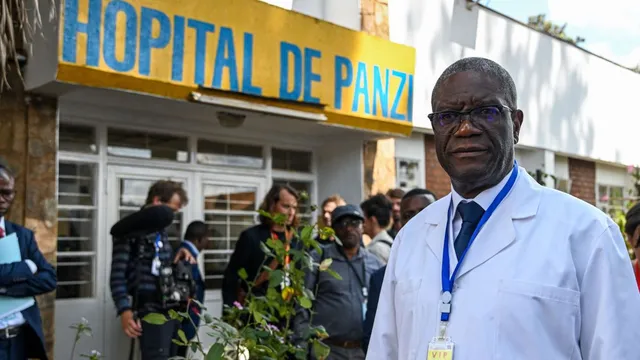
Rwanda commits atrocities in Congo, says Dr. Miracle
2025-04-05 17:00- Rwandan-backed M23 militias have taken control of large areas in eastern Democratic Republic of Congo, including key cities.
- Denis Mukwege has accused Rwanda of committing severe atrocities in Congo, comparing the situation to Ukraine.
- The escalating violence has led to thousands of deaths, rapes, and a significant displacement crisis, prompting urgent calls for international intervention.
Express your sentiment!
Insights
In recent months, the Democratic Republic of Congo (DRC) has been witnessing a significant escalation in violence, driven by Rwandan-backed M23 militias. These militias have rapidly seized large territories in the eastern DRC, starting with Goma, a major city close to the border with Rwanda, and moving on to Bukavu, another important urban center. This surge in violence has resulted in thousands of people being killed and raped, while hundreds of thousands have been displaced from their homes. Dr. Denis Mukwege, a Nobel prize-winning physician renowned for his dedication to treating victims of sexual violence in conflict, has publicly spoken out about these egregious human rights violations. He has drawn parallels between the situation in Congo and the ongoing conflict in Ukraine, accusing the international community of hypocrisy by ignoring the plight of those suffering in DRC. Dr. Mukwege's comments highlight a perceived double standard in global responses to conflicts, as he notes the severe and persistent violence occurring in Congo is being overshadowed by the media coverage of the Ukraine crisis. The M23 insurgency, reportedly supported by Rwanda, has exacerbated an already fraught situation in the DRC, where decades of conflict have led to widespread suffering. The human toll has been staggering; entire communities have been uprooted, and the escalating violence threatens to push the DRC into further instability. Dr. Mukwege's advocacy for greater international attention to this crisis is critical, as it aims to raise awareness about the ongoing atrocities and their consequences for the local population. As the fighting continues, calls for intervention from the global community have intensified. Critics argue that the neglect shown towards the DRC mirrors historical patterns in international relations, where some conflicts garner attention while others are relegated to the background. Dr. Mukwege's powerful statements urge not only for recognition of the atrocities but also for decisive action from the West, emphasizing the need for a unified response to prevent further suffering and promote stability in the region.
Contexts
The international response to the Congo War, marked by its complexity and the interplay of various geopolitical interests, has evolved significantly since the conflict erupted in the late 1990s. This conflict, which is often referred to as the deadliest since World War II, erupted primarily due to the aftermath of the Rwandan Genocide and the subsequent influx of armed groups into the eastern regions of the Democratic Republic of the Congo (DRC). A multitude of countries became involved, either directly or indirectly, with regional powers such as Rwanda and Uganda playing prominent roles in fueling the conflict, driven by their own national interests, resources, and security concerns. The involvement of these nations complicated the peace process, as varying factions sought control over the DRC’s vast mineral wealth, including diamonds, gold, and coltan, leading to an extended period of violence and instability. Internationally, the response to the Congo War has been multifaceted, involving diplomatic efforts, humanitarian interventions, and a significant United Nations (UN) presence. The UN Security Council authorized peacekeeping missions through the United Nations Organization Mission in the Democratic Republic of the Congo (MONUC), aimed at stabilizing the situation and protecting civilians amidst rampant human rights violations perpetrated by various armed groups. In an effort to curb the violence, the international community has attempted to foster negotiations between conflicting parties, though these efforts have faced challenges due to the fragmented nature of the conflict, where multiple factions opposed the Congolese government and each other, complicating any potential resolution. Humanitarian efforts have also been a crucial aspect of the international response, as the war has resulted in millions of displaced persons and devastating social and economic repercussions for the Congolese population. Various non-governmental organizations (NGOs) and international agencies have engaged in providing assistance to affected communities, addressing issues such as food insecurity, health crises, and education disruptions. However, these efforts have often been hampered by ongoing violence, logistical challenges, and a lack of stable governance in many areas of the DRC, highlighting the need for a coordinated international strategy that encompasses both short-term aid and long-term development goals. As the international community continues to assess its role in the Congo, there has been a growing recognition of the importance of sustainable peace initiatives that promote local ownership of the reconciliation process. The involvement of African regional bodies, such as the African Union, has also gained momentum, emphasizing the need for African-led solutions to the crisis. In recent years, discussions surrounding the establishment of frameworks that prioritize human rights, accountability, and economic recovery have become increasingly essential. This comprehensive approach is vital not only for addressing the immediate impacts of the conflict but also for paving the way toward a peaceful and prosperous future for the Democratic Republic of the Congo.